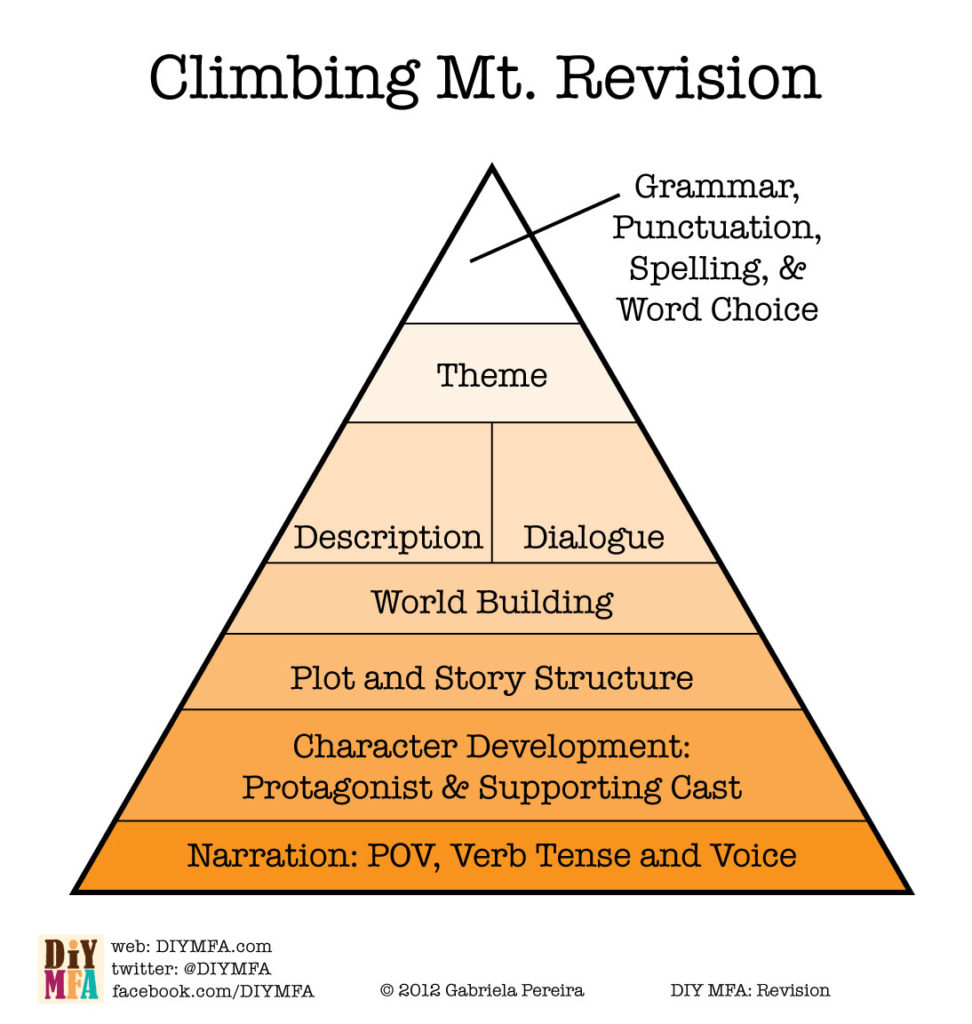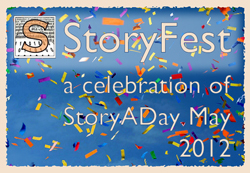As we sit here, there are only seven days left in May. Seven more stories and then you’re free to take a break, keep writing, set your stories on fire or, preferably revise them into works of genius. To help you out with that latter option I’ve recruited Gabriela Pereira from DIYMFA.com to give you some tips on revision.
OK, I’ll admit it. When I was in high school (and college and art school and grad school) I was definitely guilty of turning in work before revising it. Sure, I would do a quick spell-check and maybe give it a once-over for grammar, but rarely did I ever roll up my sleeves and do serious revision. And I totally know why I was so resistant to revision for so long: revision is flippin’ scary. The goal for this post is to make revision a little less scary. Let’s get started!
Principles of Revision
Before we dive into the how-to part of this post, here are a few things to keep in mind as you revise your work.
1) Let your writing cool down before you revise. Revision allows you to add rational choices and strategy to the frantic bursts of creativity that came out in the first draft. Take at least two weeks (maybe longer) after writing your draft to let it cool down before you revise. Step away and work on something else, then come back to it when you’re able to look at it with an objective eye. The beauty of StoryADay is that by the time you get to Day 31 of the challenge, the story you wrote on Day 1 is probably cooled off enough that you can go back and revise.
2) You need to finish first. Nothing you write is etched in stone… you can always come back and make it better later on. You can do fix just about any problem in revision, but you can’t revise a blank page. Finish first. This is why StoryADay is such an awesome challenge: it forces you to finish. Once you’re done with the challenge, you’ll have 31 finished pieces that you can pick and choose from when you start to revise.
3) Do a first read-through. Try to create a relaxing reading experience, similar to how you would read for pleasure. Make sure you’re not focused on the fact that you’re reading your own work. Make minimal notes. Your goal is to absorb the story as a whole, not nitpick over minor details. Tip: I put my drafts into Kindle format and read it on the kindle. This makes it feel like I’m reading a “real book” and not just a printed out draft. With the Kindle, I use the footnote function to make my notes, and since I’m lazy about typing notes with my thumbs, this forces me to keep the notes short.
4) Extract an outline. Write an outline of what you’ve got as a way of getting a handle on what you have written. Then adjust the outline according to the notes you made in your read-through and implement those changes in the draft.
Revise in Layers
I like to think of revision as climbing up a mountain. As you go up the mountain, you focus on the challenges and struggles of that one section. You don’t think about climbing the whole mountain at once (or else you’ll psych yourself out) but instead, only worry about that one small slice of the mountain. Revision is the same way. You start at the base of the mountain, revising the most basic elements of your story, then work your way up until you’re focusing on the nitty-gritty details like word choice and grammar. In my mind, revision looks a little bit like this:

The advantage of approaching the revision process in layers is twofold. First, you avoid overwhelming yourself because you’re only focusing on one layer at a time. Second, if you’re working with a deadline and you don’t have time to address each layer, this method can be especially valuable. If you start at the bottom and work your way up, at the very least you’ll have covered the most important elements of the story whereas if you focus on line edits first, you won’t have time to work out those bigger problems. Here’s a quick summary of each section of the revision mountain and how to address it.
Narration: This is where you consider how you’re telling the story. Is the point of view (POV) right for your story? Should it be in past tense rather than present? Is the voice of the narrator working? The best way to figure that out is to take the first page of your story and rewrite it according to the different options you’re considering, then decide which you like best.
Character Development: Don’t try to juggle all your characters at once. Start with the protagonist and figure out his/her arc, then look at key members of the supporting cast (like the villain or other important supporting characters). Work on each character separately to keep things manageable.
Plot: Here’s where extracting an outline can be extremely useful. If the typical list-format doesn’t work for you, there are many other outline options out there so you’re bound to find something that works for you.
World Building, Dialogue Description and Theme: Focus on these elements one at a time. Is the setting for your story clear? Does it feel real to the reader? How about dialogue and description? Do they flow and ring true? Finally, what’s your theme and does your story convey it?
Take-Home Message
Ultimately, revision is where you add the strategic elements to your story. Now that you know who the characters are and what’s going to happen, you can plant foreshadowing moments and hint at themes that will be important later on. You can’t do all this in your first draft because during that stage of the process you don’t know your characters or the story completely. It’s only once you know the ending and who your characters are at their core that you can manipulate the story in a strategic way.
Once you’ve revised your story, you’re ready to think about submitting it. For details on the submission process, you can look at this handy guide on How to Submit to Literary Magazines over at the DIY MFA website. And don’t forget to join in on the Sub2Pub challenge! Write on!

Gabriela Pereira is the Founder and Instigator at DIY MFA: the Do-It-Yourself Program in Creative Writing. DIY MFA is dedicated to helping writers improve their technique and build the benefits of a traditional MFA into their everyday writing lives.
Gabriela has an MFA in Creative Writing from The New School with a concentration in Writing for Children. She works as a freelance writing teacher and has taught workshops throughout New York City. Her fiction has appeared in various literary magazines and one of her lesson plans was included in the anthology DON’T FORGET TO WRITE, published by 826 National. She writes regular columns on writing for the STORIES FOR CHILDREN newsletter and CURIOSITY QUILLS PRESS.
Visit DIYMFA.com for more information or connect with Gabriela on twitter (@DIYMFA), Facebook, Google+ and Pinterest. For weekly writing boosts, signup for the newsletter WRITER FUEL and stay in the loop with all the latest at DIY MFA.


![[Write On Wednesday] – What A Girl Wants](https://storyaday.org/wp-content/uploads/2012/07/Screen-Shot-2012-07-25-at-3.49.28-PM.png)



 This week I read a great new novel called
This week I read a great new novel called 




![[Prompt] May 31 – Best Friends and Endings](https://storyaday.org/wp-content/uploads/2012/05/StoryADayWritingPromptFeaturedImage2021_600x338px.jpg)



